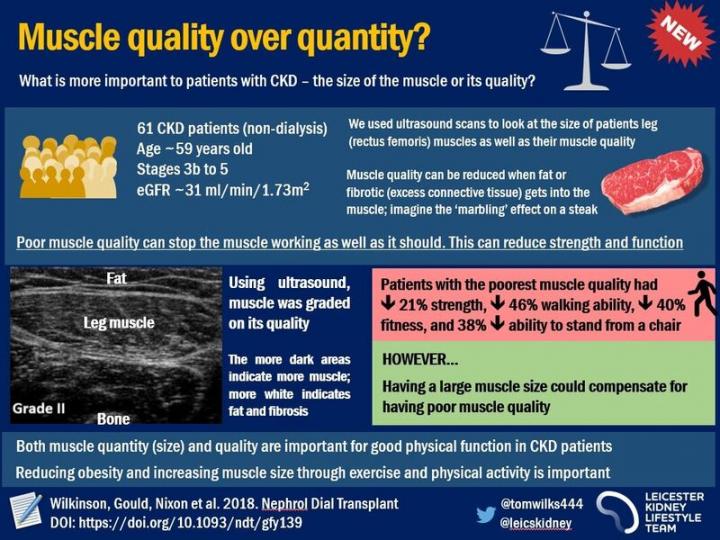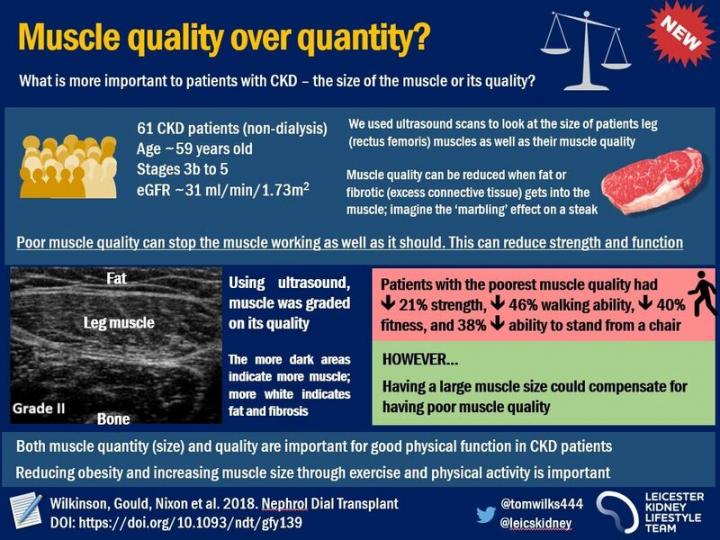
Credit: University of Leicester
The size of muscles in patients suffering from Chronic Kidney Disease (CKD) could be more important to maintaining good physical performance than muscle quality, new research has shown.
In a paper published in the journal Nephrology Dialysis Transplantation, researchers from the University of Leicester have found that patients with large muscles had better physical function, walking ability, and strength – and that having large muscle size could in some instances 'outweigh' having poor muscle quality. In this regard, quality was determined by the amount of fat or fibrosis (excess connective tissue) within the muscle tissue.
The research suggests that it doesn't necessarily matter how much fat or fibrosis is contained within a muscle – as, if the muscle is big enough, it could compensate for the lack of quality in regard to physical performance.
When fat or fibrosis gets into the muscle, this gives it the marbling effect similar to that seen on steak or other forms of meat.
This infiltration of fat can stop the muscle working properly, as it can stop the muscle fibres from contracting as well as they could without the fat being present. Fat infiltration in the muscle can also affect muscle metabolism and cause inflammation to the cells.
The study, led by Dr Tom Wilkinson and Professor Alice Smith from the University of Leicester's Department of Infection, Immunity and Inflammation, and Leicester's Hospitals, recruited 61 non-dialysis CKD patients and observed how muscle quality can be reduced when fat or fibrosis gets into the muscle.
The team used 2D ultrasound scans of the rectus femoris muscle of the quadriceps in the leg – an important muscle for everyday tasks such as walking and climbing stairs.
Physical function and strength was assessed using various tests such as walking tests, leg strength tests, walking speed, and chair stand tests.
They found that patients with greater overall body fat (e.g., overweight and obese patients) had more fat in the muscle, resulting in lower muscle quality, but that the negative effects were reduced when the muscles themselves were larger.
Dr Wilkinson said: "In cases of kidney disease, poor muscle quality was correlated with poor physical performance. However, muscle size remains the largest predictor of physical function, even when muscle quality was taken into account.
"Therefore, in addition to the loss of muscle size, our study shows that muscle quality should be considered an important factor that may contribute to deficits in mobility and function in CKD. Interventions such as exercise, especially weight lifting type exercise as previously shown by our research, could improve both of these factors."
###
An infographic about the research is available here: https://www.dropbox.com/sh/9ehqp6vvdx56cgn/AADKRyqAqmF1T-ZEhW_zLZPSa?dl=0
Peer-reviewed / Observational / Humans
More information about these labels here: http://www.sciencemediacentre.org/wp-content/uploads/2018/01/AMS-press-release-labelling-system-GUIDANCE.pdf
The study was partly funded by the NIHR Leicester Biomedical Research Centre.
The paper, 'Quality over quantity? Association of skeletal muscle myosteatosis and myofibrosis on physical function in chronic kidney disease', published in the journal Nephrology Dialysis Transplantation, is available here: https://academic.oup.com/ndt/advance-article/doi/10.1093/ndt/gfy139/5042971 / https://doi.org/10.1093/ndt/gfy139
Media Contact
Tom Wilkinson
[email protected]
@UoLNewsCentre
http://www.leicester.ac.uk
Related Journal Article
http://dx.doi.org/10.1093/ndt/gfy139





